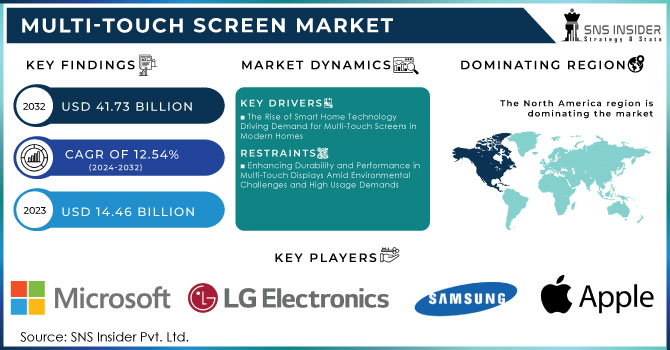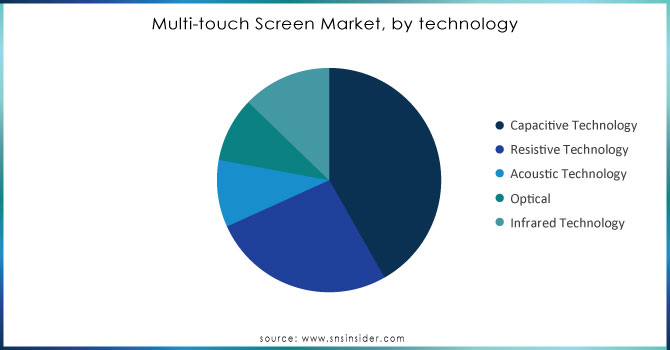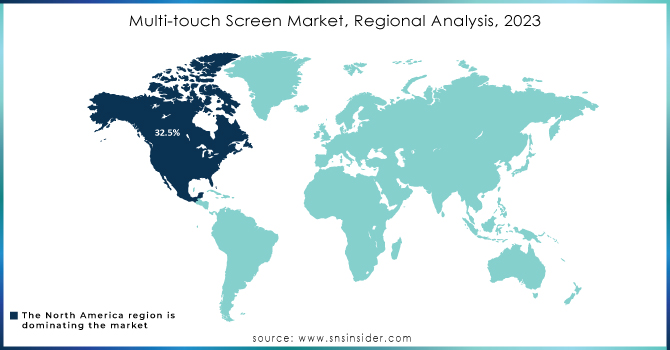Multi-Touch Screen Market Report Scope and Overview:

Get More Information on Multi-touch Screen Market - Request Sample Report
The Multi-touch Screen Market Size was valued at USD 14.46 Billion in 2023 and is expected to reach USD 41.73 Billion by 2032 and grow at a CAGR of 12.54% over the forecast period 2024-2032.
The multi-touch screen market is experiencing significant growth driven primarily by the increasing demand for interactive and user-friendly interfaces across various applications. As the number of smartphones, tablets, and other handheld devices entering the market is rising, so is the demand for advanced touch technology that allows users to navigate through the device conveniently and enhances user experience. As of 2024, nearly 4.88 billion are using smartphones across the world, or about 60.42% of the population, while since a few users may have more than one smartphone, the actual total number of active smartphones employed is about 7.21 billion. This explains the extensive penetration of smartphones and their coming into the daily activities of different regions. In 2023, approximately 128.5 million tablets were shipped globally, with over 36.8 million units shipped in the last quarter alone. Throughout the year, Apple shipped around 48.5 million iPads. More so, the implementation of multi-touch screens is already applied in such places as retail, healthcare, and education, wherein sectors use digital signs, patient monitoring systems, and learning to boost cooperation and inclusion. The screens allow for the collaboration of several users in the same space; this will be extremely useful where teamwork has to be indispensable within an environment.
Technological improvements, such as multi-touch being sensitive enough to detect higher sensitivity, responding faster than its current speed, and developing durability, actually make the multi-touch screens more exciting. Features such as gesture recognition and haptic feedback innovate further. The growing demand for smart and intelligent devices at home and in offices automatically leads to the need for touch-friendly interfaces, thus promoting intuitive control and interaction. Thus, sustained long-term growth in the market from the various applications offered and enhanced functionalities of these screens would accordingly be likely to be propelled by further developments by the manufacturers of more versatile and affordable multi-touch solutions.
Multi-Touch Screen Market Dynamics
KEY DRIVERS:
-
The Rise of Smart Home Technology Driving Demand for Multi-Touch Screens in Modern Homes
Smart home technology remains one of the dominant factors forcing multi-touch screens into growth. The higher the percentage of households embracing smart devices, the more the demand for easy and interactive interfaces. Multi-touch panels are central hubs whereby users operate various applications such as lighting, security systems, and entertainment devices. For instance, smart home hubs developed by companies such as Google and Amazon come with multi-touch screens, making it easy for customers to operate several devices from one location. The centralization provides a visual and tactile interface that enhances user experience because one can easily find their way within the various components of home automation systems. The availability of smart homes, for which multi-touch screens are always a necessary part would raise the demand for these touch screens to a greater extent. Evolution in-home technology is not only convenient and efficient but has paved the way for more complex interactions between a user and a smart device, further fueling the multi-touch screen market.
-
Digitization Across Sectors Boosting Demand for Multi-Touch Screens in Customer Engagement and Efficiency
Another strong impulse driver is the increasing attention toward the digitization of all sectors. More businesses are now investing in technologies that enhance their levels of engagement with customers and also increase the operational efficiency of businesses. Multi-touch screens are accompanied by the entire gamut of customer-facing environments, from restaurants and retail stores to restaurants, for which they create an interactive experience. Using kiosks with multi-touch screens, for example, enables customers to order, browse, and customize their selections at their convenience. In that regard, such systems have been placed by retailers like McDonald's and Starbucks, to simplify the process of taking orders, to reduce the waiting period for orders, and to make the entire process of serving the customers as efficient and easy as possible. Now, this is being borrowed and replicated in other industries like automotive and hospitality through interactive displays that will enable maximum customer experience. In the wake of organizations trying to design more engaging and efficient interaction, the need for multi-touch screen technology may skyrocket
RESTRAIN:
-
Enhancing Durability and Performance in Multi-Touch Displays Amid Environmental Challenges and High Usage Demands
Technology-related constraints are still one of the major constraints in the market for multi-touch displays because they perform worse than best under most conditions. To illustrate, in the case of extreme exposure to direct sunlight or temperature, the multi-touch screen response and accuracy degrade. In outdoor kiosks related to ticketing or information, especially those continuously seen on most theme park entrances, glare and weather conditions impose extreme limitations that affect the user experience. Another risk is the damage and durability of screens. Highly trafficked locations, including shopping malls and public transportation stations, can rub against screens with their parts causing scratches and cracking, as well as undue wear and tear on screens. For instance, touchscreen information kiosks in subway stations show signs of wear due to scratching, effectively reducing functionality and frustrating users. This requirement forces companies to search for more sustainable solutions that can accommodate a lot of usage while maintaining performance, making it difficult for manufacturers to improve its longevity without compromising the touch sensitivity.
Multi-Touch Screen Market Segmentation Overview
BY TECHNOLOGY
Capacitive technology dominated the market with the highest share of 41.7% of the multi-touch screen market in 2023 due to its added advantage of superior touch sensitivity and accuracy besides its wide acceptability in consumer electronic devices, especially smartphones and tablets. Capacitive touchscreens detect the changes in electrical charge when any conducting object, such as a human finger, touches the screen. This technology features an extremely fast and fluid experience for the user, which plays well in mainstay devices such as iPhones, Samsung Galaxy phones, and other leaders in their markets. Capacitive screens are also durable because they work through a protective glass layer, further maximizing their virtues in this highly sought-after smartphone and tablet marketplace, and that is one of the reasons for their current market superiority.
The optical segment is expected to be the fastest-growing segment from 2024 to 2032, with the increasing adoption of special applications that require larger screen sizes. Interactive kiosks and industrial displays are huge prospects for optical touchscreens. Optical technology uses infrared sensors to detect touch and will even work as a multi-touch module in rugged environments or with non-conductive objects like gloves or styluses. It is perfectly designed for large displays that are gaining popularity in retail, healthcare, and education fields. That's the reason it is appealing to the market mainly due to the scalability, flexibility, and low maintenance of the optical touch screens, which are some factors driving its rapid growth during this period.

Need Any Customization Research On Multi-Touch Screen Market - Inquiry Now
BY PRODUCT
The smartphone dominated the market share of 54.5% in 2023, driven by huge and constant demand from advanced touch technology. Since smartphones are a part of daily life used during communication, entertainment, and work activities, the focus of their manufacturers is that such multitouch screens must be highly responsive, durable, and support multi-touch gestures. The major players are Apple, Samsung, and Xiaomi. This segment has mostly innovated with more touch sensitivity, display quality, and durability. Replacing itself is extremely high, and constant up-gradation has helped this segment remain dominant through the year 2023. In addition to this, 5G-enabled smartphones have caused a sea change in demand for high-performance touchscreens, further ensuring market leadership for smartphones.
Tablets are expected to grow the fastest from 2024 to 2032 because it's being offered to so many industries and spaces like education, business, and healthcare. The demand for big, interactive touchscreens increased through remote work and e-learning, so people took off on using tablets as excellent versatile tools for presentations, online education, and professional applications like graphic design, and video conferencing. Growth in digital learning platforms and the usage of tablets by educational institutes for interactive experiences have been particularly strong drivers. In industrial and healthcare settings, tablets are increasingly gaining popularity where larger screens and multi-touch capabilities offer greater utility than those available on smartphones, thereby gaining rapidly in this segment.
BY END USE
The retail segment dominated the largest share of 28.4% in 2023 and is expected to grow at a high CAGR from 2024 to 2032 in the multi-touch screen market. This dominance can be attributed majorly to the increased adoption of interactive displays and kiosks across retail places due to an enhancement in the customer experience and effectiveness. Multi-touch screens are becoming popular among retailers for more interactive and engaging digital signage, self-service kiosks, and point-of-sale systems that allow customers to browse, order, and transact on their own. Examples of big retailers that continue to modernize using touchscreens include McDonald's, Walmart, and Zara. Growth in multi-touch technology is expected to be a high growth factor in the retail segment as increases in touch technologies and more digital transformation strategies. Brick-and-mortar stores are leveraging multi-touch screens as they are also trying to expand themselves more competitively with e-commerce operations. Interactive mirrors, self-checkout systems, and touchscreen-based product recommendations were becoming the new features of the modern retail landscape.
Multi-Touch Screen Market Regional Analysis
In 2023, North America dominated the market, accounting for 32.5% of the total share, due to its more developed technological infrastructure and high demand from consumers for touch interaction devices. The earlier adoption of multi-touch technology by all industries can also be partly accounted for the regional share. Multi-touch screens are now being widely adopted in the retail, healthcare, and education sectors for the better facilitation of user interaction and operational efficiency. For example, in the United States alone, firms like Apple and Microsoft have massively exploited multi-touch technology in consumer electronics such as smartphones, tablets, and laptops. Furthermore, interactive multi-touch kiosks are often used in the North American retail industry to engage customers, which nowadays can be seen, for example, in stores like Target and Walmart with self-checkout services and digital displays.
Asia Pacific region is expected to showcase a high growth rate during the forecast period of 2024-2032. The factors contributing to the growth of this region are rapid industrialization, increased investments in smart city projects, and robust growth in electronics manufacturing. Countries like China, Japan, and South Korea mainly manufacture electronic devices and, as a result, fuel the demand for multi-touch technology by natural order. The retail sector in Asia Pacific too is undergoing a great transformation. For example, China and other countries are using multi-touch screens in e-commerce-integrated physical stores. For example, Alibaba's "New Retail" strategy is a combination of online and offline shopping where the company uses the sales staff equipped with interactive touchscreens for a personalized experience. The digitalization that is witnessing growth in the region plus the rising need for smart devices on the part of consumers makes Asia Pacific ready for a faster growth curve of the multi-touch screen market.

Key Players in Multi-Touch Screen Market
Some of the major players in the Multi-touch Screen Market are:
-
3M (MicroTouch System, Multi-Touch Chassis Display)
-
Apple Inc. (iPhone, iPad)
-
Samsung Electronics (Galaxy S Series, Galaxy Tab)
-
LG Electronics (LG V Series, LG Gram Touch)
-
Microsoft Corporation (Surface Pro, Surface Book)
-
Sony Corporation (Xperia Series, Sony Bravia Touchscreen TV)
-
Atmel Corporation (maXTouch Controllers, XSense Touch Sensors)
-
Cypress Semiconductor Corporation (TrueTouch Controllers, CapSense Solutions)
-
Fujitsu Limited (Lifebook Series, Stylistic Tablets)
-
Sharp Corporation (Aquos Board, Sharp Touch Monitors)
-
Hewlett-Packard (HP) (HP Elite x2, HP Spectre x360)
-
Dell Technologies (XPS Series, Latitude Touchscreen)
-
Lenovo Group (ThinkPad Series, Yoga Series)
-
AsusTek Computer Inc. (ZenBook Series, VivoBook Series)
-
Synaptics Incorporated (ClearPad Touch Controllers, TouchPad Series)
-
Panasonic Corporation (Toughbook Series, Toughpad Series)
-
Toshiba Corporation (Toshiba Satellite Series, Dynabook)
-
Planar Systems (Helium Series Monitors, UltraRes Touch Displays)
-
Wintek Corporation (On-cell Touch Solutions, GFF Touchscreen)
-
BOE Technology Group Co. Ltd. (Flexible OLED Displays, BOE Touch Panel)
Some of the Raw Material Suppliers for Multi-touch Screen Companies:
-
Corning Inc.
-
Asahi Glass Co., Ltd. (AGC)
-
Schott AG
-
Nitto Denko Corporation
-
Saint-Gobain
-
SABIC
-
DuPont
-
Eastman Chemical Company
-
Toray Industries
-
3M (Materials Division)
RECENT TRENDS
-
In October 2024, Infineon Technologies launched the Automotive PSoC Multitouch GEN8XL (IAAT818X), a next-generation touch controller designed for OLED and micro-LED displays up to 24 inches. This new controller offers enhanced performance and frame rates to meet the demands of modern applications.
-
In October 2024, AAEON unveiled two new Panel PCs: the ACP-2106, featuring a 10-inch WXGA screen, and the ACP-2076, equipped with a 7-inch WSVGA Projected Capacitive Multi-Touch screen
-
In December 2023, Vecow, a leading embedded solution provider, introduced its latest product, the MTA-1010W Multi-Touch Computer. This versatile device is designed for a range of applications, including vending machines, smart buildings, and AIoT/Industry 4.0 solutions.
| Report Attributes | Details |
|---|---|
| Market Size in 2023 | USD 14.46 Billion |
| Market Size by 2032 | USD 41.73 Billion |
| CAGR | CAGR of 12.54% From 2024 to 2032 |
| Base Year | 2023 |
| Forecast Period | 2024-2032 |
| Historical Data | 2020-2022 |
| Report Scope & Coverage | Market Size, Segments Analysis, Competitive Landscape, Regional Analysis, DROC & SWOT Analysis, Forecast Outlook |
| Key Segments | • By Technology (Capacitive Technology, Resistive Technology, Acoustic Technology, Optical, Infrared Technology), • By Product (Smartphones, Tablets, Laptops, Televisions), • By End Use (Retail, Government, Enterprise, Industrial, Commercial) |
| Regional Analysis/Coverage | North America (US, Canada, Mexico), Europe (Eastern Europe [Poland, Romania, Hungary, Turkey, Rest of Eastern Europe] Western Europe] Germany, France, UK, Italy, Spain, Netherlands, Switzerland, Austria, Rest of Western Europe]), Asia Pacific (China, India, Japan, South Korea, Vietnam, Singapore, Australia, Rest of Asia Pacific), Middle East & Africa (Middle East [UAE, Egypt, Saudi Arabia, Qatar, Rest of Middle East], Africa [Nigeria, South Africa, Rest of Africa], Latin America (Brazil, Argentina, Colombia, Rest of Latin America) |
| Company Profiles | 3M, Apple Inc., Samsung Electronics, LG Electronics, Microsoft Corporation, Sony Corporation, Atmel Corporation, Cypress Semiconductor Corporation, Fujitsu Limited, Sharp Corporation, Hewlett-Packard (HP), Dell Technologies, Lenovo Group, AsusTek Computer Inc., Synaptics Incorporated, Panasonic Corporation, Toshiba Corporation, Planar Systems, Wintek Corporation, BOE Technology Group Co. Ltd |
| Key Drivers | • The Rise of Smart Home Technology Driving Demand for Multi-Touch Screens in Modern Homes • Digitization Across Sectors Boosting Demand for Multi-Touch Screens in Customer Engagement and Efficiency |
| RESTRAINTS | • Enhancing Durability and Performance in Multi-Touch Displays Amid Environmental Challenges and High Usage Demands |

